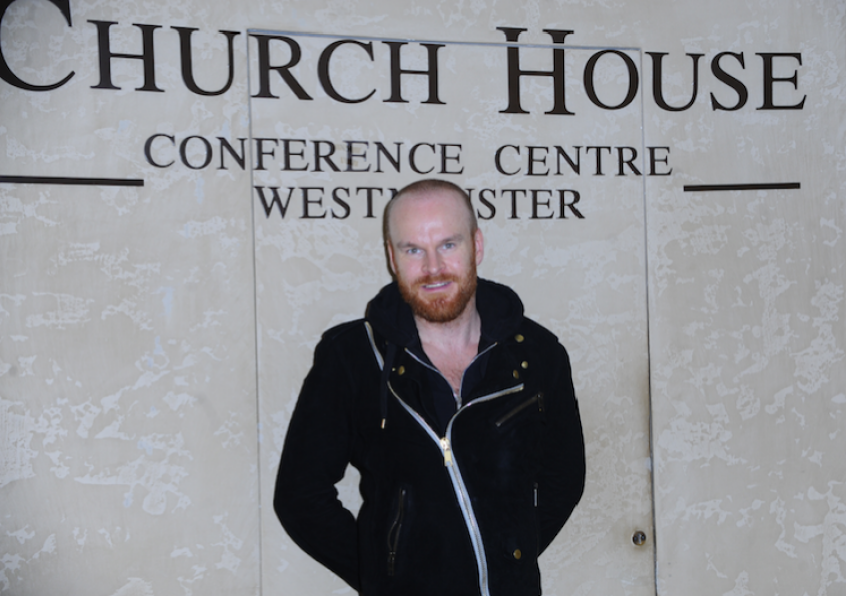December 1 marks World AIDS Day. Since September we have seen stereotypes and stigma challenged, as well as a spotlight shone on the injustice suffered by the victims of contaminated blood in the UK, through the Infected Blood Inquiry.
I am HIV positive and also a passionate Christian, with faith underpinning every aspect of the campaigning I do. World AIDS Day is about celebrating the great medical advances which have taken place around the treatment and prevention of HIV, but also a time to remember those who have died of AIDS.

One of the greatest tragedies the UK faced around HIV/AIDS was the large number of HIV transmissions which occurred as a consequence of contaminated blood or plasma transfusions in the 1970s, 1980s and early 1990s. I did not become HIV positive in this way, but it is an issue which is very close to my heart.
From September 24-26 the preliminary hearings for the Infected Blood Inquiry took place at Church House, in Westminster. From a practical perspective, the Assembly Hall in Church House could accommodate the hundreds of people who came to attend the hearings. It also added a sense of gravitas to the proceedings. While the tone was secular in nature, the great dome is the perfect space for reflection and debate. It has seen some of the most important decision-making in the Church of England and hosted the House of Commons for a period during World War Two.
The inquiry aims to investigate how so many people, often haemophiliacs, were given blood products or received transfusions infected with HIV, hepatitis C and other viruses before September 1991. At least 2,400 people have died as a result and this figure continues to rise.
The scale of the inquiry is enormous, because of the number of people affected. These include partners and other family members of the infected. The period of time spans decades. The number of core participants currently stands at 1,272, the largest of any public inquiry to date. The next stage of the inquiry is scheduled to commence on April 30, 2019, with hearings anticipated to last for at least 15 months.
The commemoration service which opened the preliminary hearings began with a video showing images of some of the people affected. I was struck by the range of people represented. There was a young man with a guitar, then two loving parents and a child, followed by a group of people angrily protesting near the Bank of England. I was aware that, all around me in the hall, were their widows, widowers, lovers, daughters, sons, mothers, fathers, grandparents and friends.
A second video included excerpts from interviews with some of the people affected. One woman said: 'It's taken everything away from me.' A man said: 'I want truth, I want justice.' Another person said: 'I just hope, upon all hope, that I'm still alive by the time that this inquiry ends and I can have some closure in my life.'
Many people in the hall, including myself, were moved to tears. After years of having to deal in silence with their grief and anger, there was a sense of catharsis as, at the end of the service, loved ones were able to place messages for those they had lost in glass phials, which will form a permanent memorial.
For example, I heard about a husband, a severe haemophiliac, who was told at the age of 50 that he was HIV positive because of historic treatment using the clotting agent Factor 8, then perceived as a wonder drug. There were a number of widows who had been secondarily infected with HIV through their now dead haemophiliac husbands. There were lengthy delays in informing haemophiliacs of the risks posed by the clotting agent, meaning that many unwittingly passed HIV on to their partners. A young haemophiliac had been diagnosed with HIV at the age of 12 and subsequently spent his teenage years in care.
I was particularly touched when a lady explained to me that she was here to represent her brother. He was a haemophiliac and had received contaminated blood as a teenager, before being diagnosed with HIV at the age of 15. He died in the early 1990s of AIDS. She explained that she was wearing a Bob Marley t-shirt, as Bob Marley was her brother's favourite musician and he had seen him play live shortly before his death.
Hopefully this inquiry will provide clarity concerning what happened around the contaminated blood products and transfusions. How many people were infected? What was the impact, including physical, mental, social and financial, on those infected and affected? What are the key ethical issues? Did medical professionals use treatments without consent or for research purposes? When did doctors, pharmaceutical companies and the government become aware of the infection risk? Why did it take so long to inform victims? As many of the victims allege, have efforts been made in the past to cover up the scandal, by either medical professionals, the pharmaceutical industry or the government? These questions need to be answered.
I take HIV medication daily, which is side-effect free. I know that I can expect a normal lifespan. Although there have been huge advances in the treatment of HIV, there remains a lack of awareness around the virus and much stigma.
This World AIDS Day, with the preparation for next year's Infected Blood Inquiry hearings ongoing, we should think and pray for the many people who were and continue to be impacted by contaminated blood. One of them was Annie Walker, who received infected blood containing hepatitis C at the age of 19 and died in 2016 of liver cancer aged 62. She said the victims deserve not just an apology, but justice for everyone. This is a battle cry which resonates for every person living with, or impacted by, HIV, hepatitis C or any other blood-borne virus today.
Philip Baldwin is a human rights activist.













